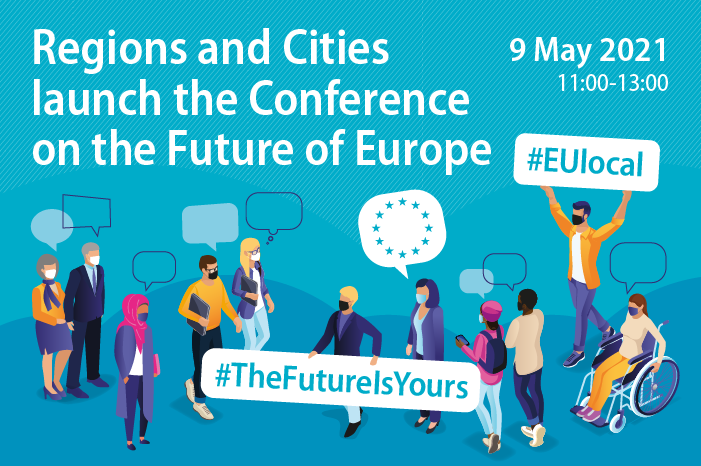The local dialogue in Strasbourg is organised by the European Committee of the Regions with the French Ministry for territorial cohesion, the City of Strasbourg, the French associations Régions de France, the Assembly of Départements de France and the association of French Mayors.
The local event will be attended, among others, by Commissioner Šuica, MEP Verhofstadt and Portuguese Secretary of State for European Affairs, Ana Zacarias.
On the occasion of the launch of the Conference on the Future of Europe on 9 May in Strasbourg, the European Committee of the Regions is organising, together with the French government and the main French territorial associations, a local dialogue which will give the floor to local and regional elected representatives from all over Europe and to European citizens. The debate will take place immediately before the official launch of the Conference with the aim of marking its territorial dimension and guaranteeing that it reaches out to people in regions, cities and villages across Europe. Participants will discuss how to best involve local elected politicians and local communities in the Conference and how to ensure a stronger role for local and regional authorities in the Europe of tomorrow.
The event is organised jointly with the French Ministry for territorial cohesion and relations with local and regional authorities, the City and Eurometropole of Strasbourg, the French associations Régions de France, Assembly of Départements de France and the association of French Mayors. The local event will be attended, among others, by Apostolos Tzitzikostas, President of the European Committee of the Regions, Dubravka Šuica, Vice-President of the European Commission in charge of Democracy and Demography, Guy Verhofstadt, Co-Chair of the Executive Committee of the Conference on the Future of Europe, and Ana Paula Zacarias, Portuguese Secretary of State for European Affairs. Representatives from prominent EU associations and movements will also join the debate.
The event’s detailed programme is available online and below.
Practical information:
– Date and time: Sunday 9 May, 11:00-13:00
– Place: Strasbourg City Hall, Grand Salon and online (Zoom platform)
– Web-streaming platforms: CoR website CoR Facebook page CoR YouTube channel
– Interpretation in FR, EN, DE, IT, ES, PL
– Link to the event: https://euconf-eu.zoom.us/j/96601118862?pwd=dHFnYWt5L3N3d3ZZL1dheCtYaE1oZz09
Meeting ID: 966 0111 8862
Passcode: 711754- Event listed on the Conference multilingual online platform.
Full programme:
The Conference on the Future of Europe: an opportunity to build together the “European House of Democracy” on the foundations of its regions, cities and villages
Moderator: Rebecca Donauer, journalist, ARTE
Introduction (11:00-11:15):
European Anthem
Introduction by Jeanne Barseghian, Mayor of Strasbourg and 1st Vice-President of the Eurometropolis of Strasbourg and André Viola, President of the French delegation to the European Committee of the Regions, Member of the Aude Departmental Council
Panel 1: Engaging in local dialogue with citizens for a more resilient Europe
(11h15-12h00)
Pre-recorded videos of citizens from civil society, academic, economic or cultural spheres answering: What is the CoFE? What is citizens’ place in the EU? The future of Europe in three words?
Debate among speakers:
Apostolos Tzitzikostas, President of the European Committee of the Regions, Governor of the Region of Central Macedonia, Greece
Dubravka Šuica, Vice-President of the European Commission, Commissioner for Democracy and Demography
Guy Verhofstadt, Co-Chair of the Executive Committee of the Conference on the Future of Europe
Ana Paula Zacarias, Portuguese Secretary of State for European Affairs
The contribution of the future French Presidency:
Joël Giraud, Secretary of State in charge of rurality in the Ministry for Territorial Cohesion and Relations with Local Government
Renaud Muselier, President of the French Regions, President of the Provence-Alpes-Côte d’Azur Region
Frédéric Bierry, President of the European Collectivity of Alsace
François Baroin, President of the Association of Mayors of France, Mayor of Troyes Contribution of a European association:
The contribution of the Council of European Municipalities and Regions (CEMR):
Stefano Bonaccini, President of the Council of European Municipalities and Regions (CEMR), President of the Emilia Romagna region
Panel 2: Strengthening democratic legitimacy: a Conference for and with citizens – the contribution of the
European Committee of the Regions (12h0012h50)
Pre-recorded videos of citizens from civil society, academic, economic or cultural spheres stating how they see the future of Europe.
Debate among speakers:
The contribution of Youth associations:
Eva Maydell, President of the International European Movement, MEP
Silja Markkula, President of the European Youth Forum
The contribution of CoR members:
Olgierd Geblewicz, President of the EPP Group in the European Committee of the Regions, President of the Western Pomerania Region
Christophe Rouillon, President of the PES Group in the European Committee of the Regions, Mayor of Coulaines François Decoster, President of the Renew Europe Group in the European Committee of the Regions, Mayor of Saint-Omer
Władysław Ortyl, President of the ECR Group in the European Committee of the Regions, President of the Podkarpackie Region
Kieran McCarthy, President of the EA Group in the European Committee of the Regions, Member of Cork City Council Ms Satu Haapanen, Co-Chair of the Greens Group in the European Committee of the Regions, Member of Oulu City Council
Closing remarks by Vasco Alves Cordeiro, First Vice-President of the CoR and Member of the Regional Parliament of the Azores
Contact:
Marie-Pierre Jouglain
mariepierre.jouglain@cor.europa.eu
Mobile: +32 473 52 41 15




